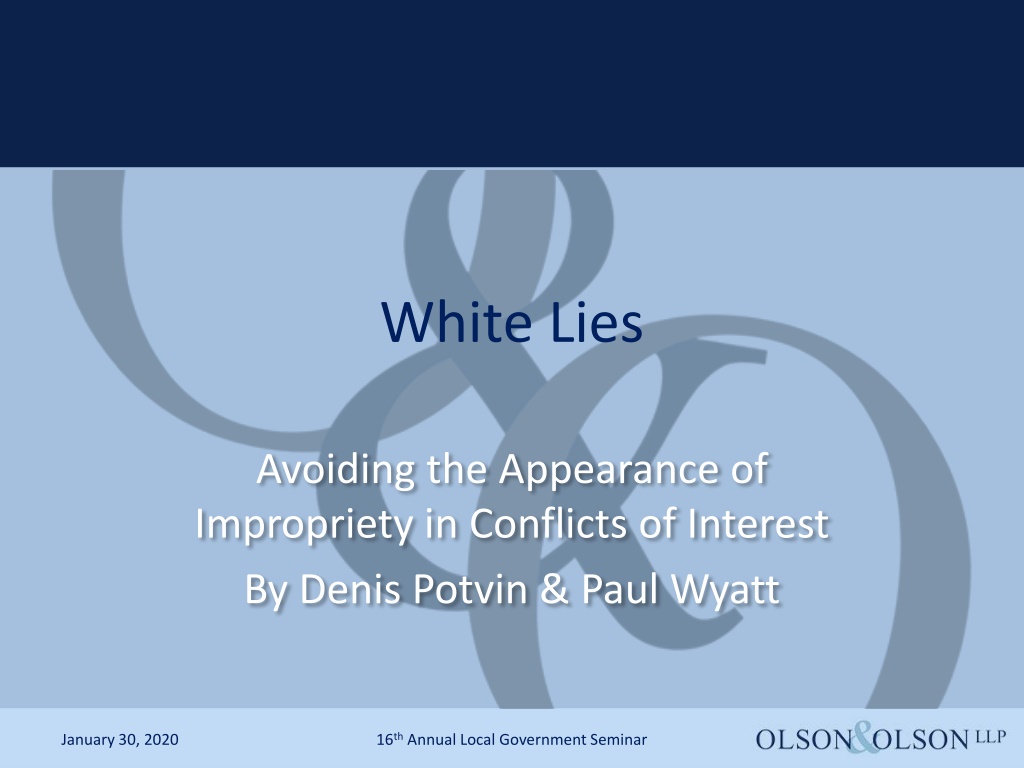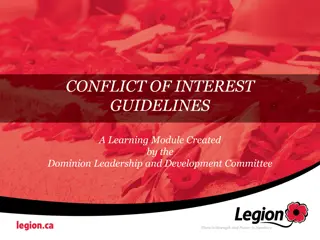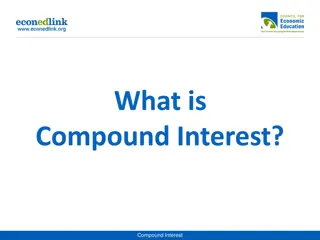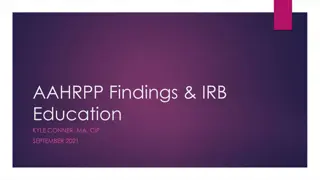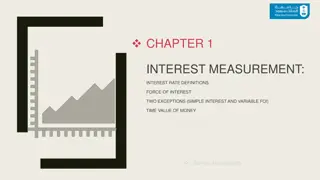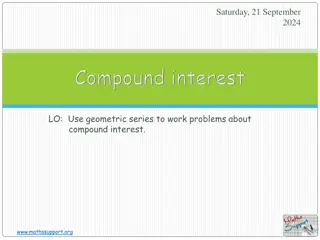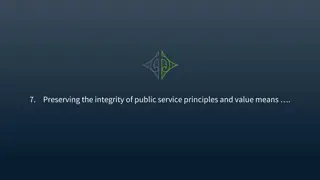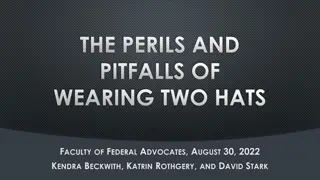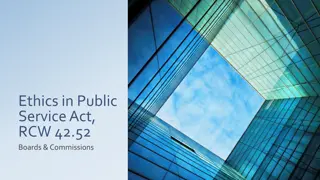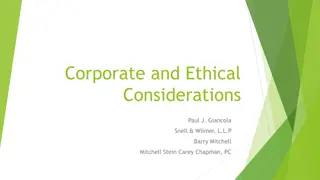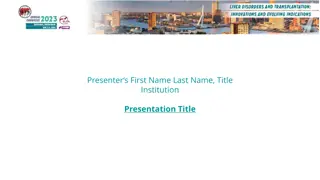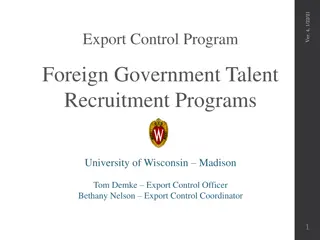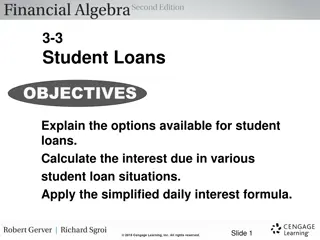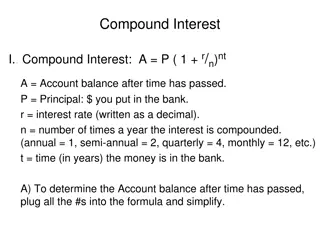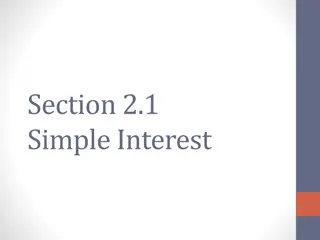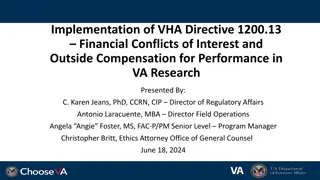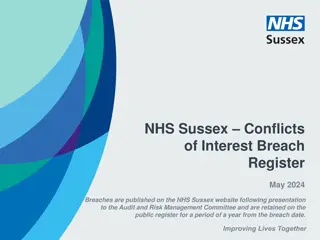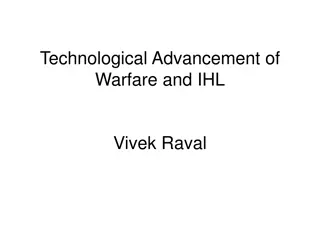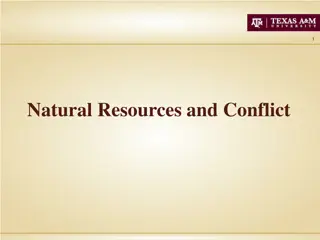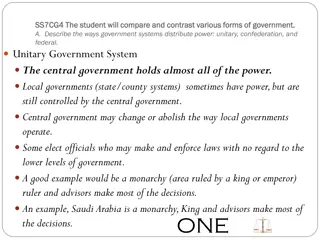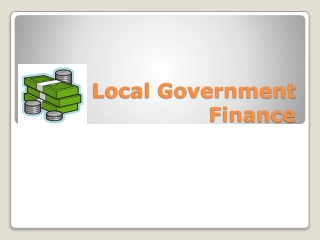Navigating Conflicts of Interest in Local Government
This content delves into the importance of avoiding the appearance of impropriety in conflicts of interest for government officials. It emphasizes the need for responsible handling of conflict situations and seeking guidance from ethics advisors or neutral observers. The discussion highlights the potential consequences for public servants who engage in deceptive practices and outlines the ethical standards expected from state officers and employees. Overall, the content underscores the significance of upholding integrity and transparency in local government roles.
Download Presentation

Please find below an Image/Link to download the presentation.
The content on the website is provided AS IS for your information and personal use only. It may not be sold, licensed, or shared on other websites without obtaining consent from the author. Download presentation by click this link. If you encounter any issues during the download, it is possible that the publisher has removed the file from their server.
E N D
Presentation Transcript
White Lies Avoiding the Appearance of Impropriety in Conflicts of Interest By Denis Potvin & Paul Wyatt 16th Annual Local Government Seminar January 30, 2020
Appearance Matters Government officials are judged by their actions and their relationships as they appear on their face Public does not see motivations, feelings, and character. Government officials should handle conflict situations responsibly with an ethics advisor or neutral observer. 16th Annual Local Government Seminar January 30, 2020
Who gets in trouble for the lie? Public Servant A person elected, selected, appointed, employed or otherwise designated as one of the following, even is he has not yet qualified for office or assumed his duties: an officer, employee, or agent of government.Texas Penal Code Section 1.07 Local Public Official A member of governmental body or another officer appointed that exercises duties beyond that of being advisory in nature. Texas Local Government Code Chapter 171 Local Government Officer Board or commission members are local government officers as members of a governing body of a local government entity. Texas Local Government Code 176 City official All board and commission members are city officials as defined by Section 18- 2 of Code of Ordinances. City of Houston Code of Ordinances Chapter 18 16th Annual Local Government Seminar January 30, 2020
What lie? A state officer or employee should not: (1) accept or solicit any gift, favor, or service that might reasonably tend to influence the officer or employee in the discharge of official duties or that the officer or employee knows or should know is being offered with the intent to influence the officer s or employee s official conduct; (2) accept other employment or engage in a business or professional activity that the officer or employee might reasonably expect would require or induce the officer or employee to disclose confidential information acquired by reason of the official position; (3) accept other employment or compensation that could reasonably be expected to impair the officer s or employee s independence of judgment in the performance of the officer s or employee s official duties; (4) make personal investments that could reasonably be expected to create a substantial conflict between the officer s or employee s private interest and the public interest; or (5) intentionally or knowingly solicit, accept, or agree to accept any benefit for having exercised the officer s or employee s official powers or performed the officer s or employee s official duties in favor of another. Gov't Code 572.051. 16th Annual Local Government Seminar January 30, 2020
Appearance of Impropriety Private Interest in Measure or Decision If a board member has a private or personal interest in a measure, proposal, or decision pending before the board, the board member must disclose that fact to the rest of the board in an open meeting and must refrain from voting or otherwise participating in the matter. Gov t Code 572.058. The law specifies that a person does not have a "private or personal interest" in a matter if the person is engaged in a profession, trade, or occupation, and the person s interest in the matter is the same as others similarly engaged 16th Annual Local Government Seminar January 30, 2020
Avoiding the Appearance of Impropriety Ethics laws are only minimum guidelines No law can responsibly deal with the appearance of impropriety because public appearance is such a delicate situation. Even though a public official s relationship with someone in a matter before him/her may not be covered by ethics rules, responsibly handling the situation builds public trust. 16th Annual Local Government Seminar January 30, 2020
Best Practices 16th Annual Local Government Seminar January 30, 2020
Know and Follow the Rules The Rule Texas Penal Code Texas Government Code and Local Government Code City Charter Code of Ordinances 16th Annual Local Government Seminar January 30, 2020
Texas Penal Code A person commits an offense if he intentionally or knowingly offers, confers, or agrees to confer on another, or solicits, accepts, or agrees to accept from another any benefit as consideration for the recipient's decision, opinion, recommendation, vote, or other exercise of discretion as a public servant, party official, or voter Tex. Pen. Code Ann. 36.02 Benefit means anything reasonably regarded as pecuniary gain or pecuniary advantage, including benefit to any other person in whose welfare the beneficiary has a direct and substantial interest. 16th Annual Local Government Seminar January 30, 2020
Texas Penal Code Honorarium A public servant commits an offense if the public servant solicits, accepts, or agrees to accept an honorarium in consideration for services that the public servant would not have been requested to provide but for the public servant's official position or duties. Tex. Pen. Code Ann. 36.07 In other words, if the invitation is due to your public office, you cannot accept. Except, you may accept transportation/lodging expenses and meals in connection with public servant rendering services (i.e. addressing the audience or engaging in a seminar) 16th Annual Local Government Seminar January 30, 2020
Texas Penal Code Gifts Do not solicit or accept Some exceptions, Gift is from personal/professional relationship Political contribution under election code Item with value less than $5, excluding cash or negotiable instrument Food, entertainment, or travel accepted as a guest* Most applicable laws and regulations are punishable as a Class A Misdemeanor 16th Annual Local Government Seminar January 30, 2020
Texas Law on Ethics If a local public official has a substantial interest in a business entity or in real property, the official shall file, before a vote or decision on any matter involving the business entity or the real property, an affidavit stating the nature and extent of the interest and shall abstain from further participation in the matter. Tex. Loc. Gov't Code Ann. 171.004 16th Annual Local Government Seminar January 30, 2020
Conflicts of Interest Texas Local Government Code 171 A person has a substantial interest in a business entity if: the person owns 10 percent or more of the voting stock or shares of the business entity or owns either 10 percent or more or $15,000 or more of the fair market value of the business entity; or funds received by the person from the business entity exceed 10 percent of the person's gross income for the previous year. A person has a substantial interest in real property if the interest is an equitable or legal ownership with a fair market value of $2,500 or more. A local public official is considered to have a substantial interest under this section if a person related to the official in the first degree by consanguinity or affinity, has a substantial interest 16th Annual Local Government Seminar January 30, 2020
Vendor Conflict Disclosure Local Government Code Chapter 176 A local government officer must file a conflicts disclosure statement with respect to a vendor or potential vendor with whom the officer or family of the officer has: an employment or other business relationship that results in taxable income, other than investment income, that exceeds $2,500* Received one or more gifts that have an aggregate value of more than $100 in the 12-month; or** family relationship*** 16th Annual Local Government Seminar January 30, 2020
Texas Government Code Open Meetings Act Compliance with the Texas Open Meetings Act is required for Boards or Commissions that make final decisions, issue permits or licenses, or adopt rules regarding public business. Board or Commissions should post agenda 72 hours prior to commencement. Be consistent and comply with every meeting 16th Annual Local Government Seminar January 30, 2020
Texas Government Code Texas Public Information Act Scientia potentia est. Sir Francis Bacon Fundamental philosophy of representative government is that government is the servant and not the master of the people Texas policy is that each person is entitled, unless otherwise expressly provided by law, complete information about the affairs of government and the official acts of public officials and employees. The people, in delegating authority, do not give their public servants the right to decide what is good for the people to know and what is not good for them to know. Tex. Gov't Code Ann. 552.001 16th Annual Local Government Seminar January 30, 2020
Is this a conflict? 16th Annual Local Government Seminar January 30, 2020
Hows about this one? 16th Annual Local Government Seminar January 30, 2020
What about this? 16th Annual Local Government Seminar January 30, 2020
